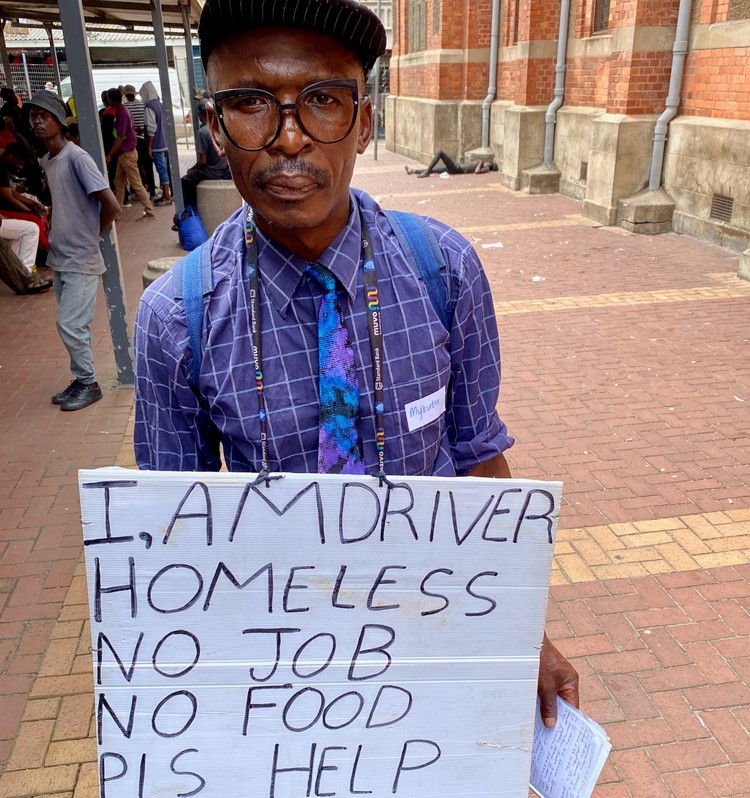
22 November 2024
Mykuta Mpana is homeless in Durban. He attended this week’s homeless meeting. “I am a driver. I came here today with this board to see if I could sell myself. I have three children back home in the Eastern Cape that I need to feed.” Photos: Greg Ardé
If one key message emerged from the 8th National Homeless Conversation held in eThekwini this week, it was that homeless people want to be front and centre of any conversation about their plight.
About 200 people representing non-governmental organisations (NGOs) and homeless people met at the Denis Hurley Centre in Durban for two days this week.
Proceedings kicked off with homeless people invited to take centre stage to talk about how they are treated, including by NGOs, government officials and other homeless people.
Their stories provided a backdrop for conversations about immediate relief for people living on the streets and for policies about homelessness.
Although no government officials attended, this is the 8th annual national homeless conversation organised by NGOs.
Homeless people spoke of how they had ended up on the streets – some were orphaned, fled domestic violence, grappled with substance abuse, or came to the city in search of work.
They told harrowing stories of street life.
Some had been raped, others robbed and beaten. Many cannot access chronic medication without identity documents.
Shelters were often unhygienic, and ambulances refused to carry them.
“We are invisible on the street,” said one man. “Most people pretend they don’t see us. Others treat us all like criminals.”
Another man told how he took his desperately sick friend to the police station and was turned away because they were poor and dishevelled. “They told us to go away. My friend was coughing blood. He died that day.”
A woman related how her family rejected her because of her sexual orientation. On the streets, she was robbed of her meagre possessions, including her ID document and work references.
“At the police station, they were only interested if I was a boy or a girl.”
After the open session, GroundUp interviewed some homeless participants.
Mandisa Manzi said homeless people were “treated like garbage”. “There is no dignity for us. We have been stigmatised.”
Slondile Mjara said, “We are treated like smelly untouchables. I am not allowed in the public library.”
David Williams said, “People treat us like trouble because of their prejudice. They don’t make us part of the discussion about our future. What is the plan for us? People don’t want to lie around the whole day. We have no family support, and some people are obviously mentally ill.
“At least this meeting gives us a platform to talk for ourselves.”
Professor Stephan de Beer from the University of Pretoria’s Unit for Street Homelessness said the gathering was an “opportunity to reflect on whether our interventions are working and where we are failing”.
He said government policies affecting homeless people varied from empathetic to emphasising punitive law enforcement.
Jobs, housing, and psycho-social support are central to homeless solutions.
De Beer was critical of the absence of government officials at the meeting.
Denis Hurley Centre director Dr Raymond Perrier said the gathering focused on developing strategies for addressing a complex range of issues, including shelters, addiction, and urban gardening.
“You must deal with each, but you can’t address them without the state. The state response to homelessness is extremely inconsistent.”
Perrier said census data on homelessness was unreliable.
Estimates by NGOs (from around the country who attended the conference) suggest there are fewer than 50,000 homeless people in Durban, Johannesburg, Cape Town and Tshwane.
“This is not insurmountable. The problem is in perceptions around safety and security and crime and grime.”
Jon Hopkins from Uturn, an NGO in Cape Town, said different homeless programmes around the country had varied levels of success.
“Some do shelters well. Others do work projects well. This meeting helped us understand different challenges. We saw a tent shelter in Durban during Covid near the beachfront. Some might say it is better than nothing, but it was not pleasant or dignified.
“Homelessness encompasses so many different issues, from addiction to jobs, that it falls between the cracks. Which government department is mandated to deal with these problems? So we see a lot of buck-passing.
“The approach towards homeless people is generally one of three things: punitive (move them away), compassionate (give them soup and blankets), or developmental (which deals with all the issues from trauma and addiction to housing and jobs).”
Hopkins suggested the government establish a single unit to ensure collaboration on issues affecting homeless people.
The Durban conference included tours to shelters and breakaway groups, considering the assistance provided to homeless people and interventions that have helped some people get off the streets.
Eric Badise lived on the streets of Durban and in shelters for three years. He washed cars and taxis to cover the R40-a-day shelter costs before joining the Denis Hurley Centre Street Lit project, which helps homeless people earn money by selling second-hand donated books. “I used to share a big room with many men. There is no privacy, and you must get a friend to watch your belongings while you shower or go to the toilet. There are many struggles on the streets - finding a place to sleep and getting food. It is dangerous, and people sometimes get into drugs and alcohol. But I can afford to rent my own flat now because I sell books. I read to understand my work. Reading has made me realise my potential. All of us have potential and creativity.”